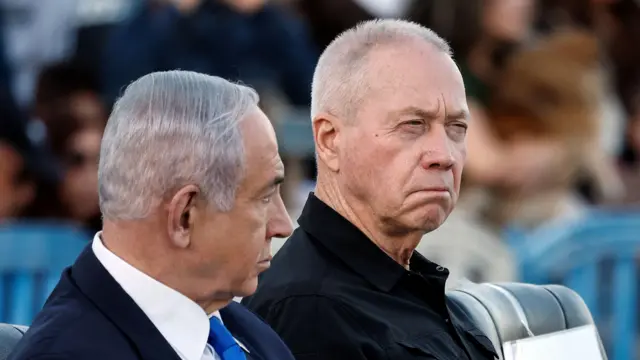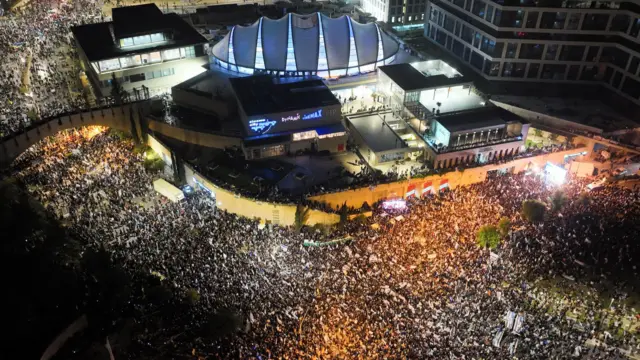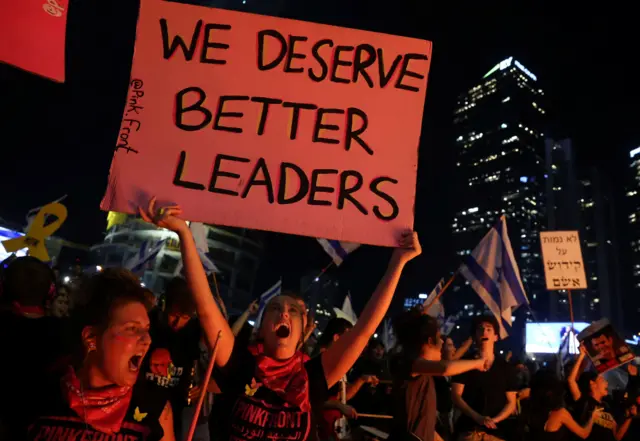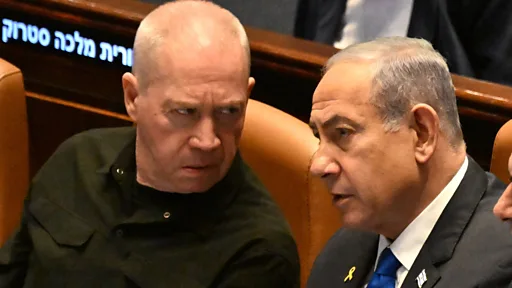
image source, Reuters
- Author, Mahmoud Adama
- Role, BBC
-
The dismissal of Israeli Defense Minister Yoav Galant sparked strong reactions in the midst of the war that Israel is waging on several fronts.
It is expected that a joint press conference will be held on Wednesday for opposition leaders in the Israeli Parliament (Knesset) after the dismissal decision.
Israeli Prime Minister Benjamin Netanyahu announced in a statement on Tuesday that Gallant was dismissed from his position, and Foreign Minister Israel Katz was appointed to take over the ministry as his successor, while Gideon Saar was appointed Minister of Foreign Affairs.
Netanyahu said: “The crisis of confidence that occurred between me and the Minister of Defense did not make it possible to continue managing the war in this way.”
For his part, Gallant commented on the X platform by saying that “the security of the State of Israel was and will remain his mission in life.”
During his speech last night, Gallant considered that his dismissal came as a result of disagreements over three issues: “the conscription law, the commitment to recover hostages, and the formation of an official investigation committee into the events of October 7.”
Some Israeli media reported that Netanyahu would dismiss leaders in the security establishment, and the Prime Minister immediately announced that Netanyahu phoned the chiefs of staff, Mossad, and Shin Bet last night and informed them of his expectation of continuing joint work with Katz.
Political analyst Eli Nissan tells the BBC that Gallant’s dismissal is “insane”.
Nissan considers his dismissal during a time of war to be unreasonable, stressing that there is a difference in views between Netanyahu and Gallant.
The political analyst believed that the Prime Minister’s move was “not appropriate in days of war.”
Roni Shaked, a researcher at the Truman Institute at the Hebrew University, said during an interview with the BBC that the new Defense Minister Yisrael Katz does not have the military experience and strength like Gallant.
He considered that the only winner from what was happening was Netanyahu, explaining that he imposed his opinion and policy on the ground.
After announcing Donald Trump’s victory as president of the United States, Shaked believes that his policy up to this moment is unknown and that Israel will not advance, but rather will return to what it was on October 1, 2023.
Disagreements started a year ago

image source, Reuters
Tal Shalev, chief political correspondent at the Walla website, told the BBC, “The differences between Gallant and Netanyahu began in March 2023 during the events of the judicial amendments.”
Israeli analyst Mazal Moalim told the BBC that the dispute between Netanyahu and Gallant is essentially a “political issue,” considering that Gallant “was planning to replace Netanyahu in an attempt to embarrass him and make him weak in front of the world.”
Moalim considered that Gallant had begun his attack on Netanyahu, so Netanyahu’s office issued a statement clarifying that Gallant was adopting what she called the “anti-Israel narrative,” and the government office brought charges against him that Moalim described as “difficult and dangerous.”
“Gallant Night” again

image source, Reuters
Gallant is the only minister who came out against the judicial amendments and declared to the world that this constitutes a danger to the State of Israel. Twenty-four hours after his statements at the time, Netanyahu dismissed him, and Israelis demonstrated throughout the country in an unprecedented manner, with the participation of nearly a million demonstrators, and it was called “Gallant Night.” According to what Shalev told the BBC.
At that time, the Israeli Labor Union announced a general strike, and Netanyahu retracted his decision to dismiss Gallant. Since then, the relationship between Gallant and Netanyahu has been described as “bad,” noting that Gallant has decisions and viewpoints that “oppose his prime minister.”
Tal Shalev believes that the Israeli security establishment supports any deal on the table and wants to reach a ceasefire agreement in the Gaza Strip.
Immediately after the announcement of Gallant’s dismissal, hundreds of Israelis demonstrated in Tel Aviv and some Israeli cities, blocking some main streets.
The Israeli police arrested 40 demonstrators in light of the protests in the city of Tel Aviv, according to Haaretz newspaper.
The Israeli police were prepared in advance for the Galant dismissal protests and expected thousands to participate, according to Israeli Channel 12.
Israeli reactions
Officials in two security agencies said that dismissing Gallant during a time of war was an irresponsible act in light of a possible Iranian attack, according to the Israeli Broadcasting Corporation.
Israeli President Isaac Herzog warned of “political turmoil” after the dismissal of Defense Minister Yoav Galant.
While National Security Minister Itamar Ben Gvir praised the decision to dismiss Gallant, he said, referring to Gallant: “Complete victory cannot be achieved with him.”
Opposition leader Yair Lapid also called on all Israeli citizens to take to the streets, and called on the families of Israeli hostages to demonstrate in rejection of his dismissal.
Senior officials of the security establishment expressed their shock at the decision to dismiss Gallant, according to the Israeli Walla website.
The White House commented that Gallant was an important partner in contributing to Israel’s security, while American officials expressed their surprise at this decision.
“He made defeatist statements”
Noam Amir, a political commentator for the Israeli Channel 14, which is close to Netanyahu, believed that the move to dismiss Gallant was supposed to happen some time ago, and said that Gallant knew that “his hour was approaching.”
Knesset member Dan Illouz, from the Likud Party, spoke about the need for there to be absolute trust between the Prime Minister and the Minister of Defense, and once trust is broken, the matter becomes dangerous.
Knesset Member Tali Gottlieb from the Likud Party commented on the dismissal by saying: “Better late than never,” noting that Gallant “is the one who makes defeatist statements, and whoever makes statements that insult the prime minister during the war must leave.”
Main player
Military affairs analyst Eyal Alima told the BBC that Gallant’s dismissal in the midst of the war and the continuation of military operations in the Gaza Strip without reaching a deal to return the hostages will lead to “an explosion in the Israeli internal situation.”
Alima stressed that the Israeli security establishment’s primary mission is to return the hostages, and this obligates Israel to stop the war, noting that the Israeli Chief of Staff spoke about this publicly.
Israeli political analyst Eli Nissan believes that “Netanyahu does not like for one of his government coalition ministers to stand out on the scene and prefers for him to be the main player.”



